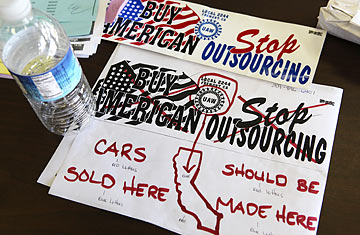
A year after the bailout of Chrysler and General Motors by the U.S. Treasury, anger over contract concessions is simmering within the ranks of the United Auto Workers (UAW).
At General Motors, where labor strife has lurked below the surface during much of the company's recent history, workers at five different plants who transferred back to GM from its former subsidiary are frustrated by the company's demands for more concessions. Protests by union members are blocking the contract changes deemed necessary by the company. "In regard to the Delphi plants, discussions between GM and the UAW are still ongoing, so no further details are available at this time," says a GM spokesman.
Much of the opposition is coming from workers from GM plants in Saginaw and Grand Rapids, Mich., and Lockport and Rochester, N.Y., where UAW members say they are being pushed to renegotiate a contract that included concessions they signed only last year, when the plants still belonged to the bankrupt Delphi Corp. "We haven't seen anything in writing yet, but we know they're coming for us again," says a GM worker from Grand Rapids. "We also know they want a 'no strike' clause."
"The membership is screaming 'Hell no!' on this deal," says a GM worker from Rochester. "We will no longer allow them to hold the old 'Do it, or we will close your plant' b.s. over us any longer. Our feeling is basically, Go ahead. They have already taken too much for us to care anymore."
The workers say they have given up cost-of-living allowances, overtime after eight hours in place of wage increases, a holiday, some break time, the jobs bank and education benefits. Entry-level wages have been cut in half, which has translated to even lower production-labor costs. "We will not stand for further concessions negotiated by our representatives," proclaimed a resolution that was turned in for consideration at the UAW convention in June by workers from the Ford assembly plant in Chicago. "I've never seen people so frustrated," says a veteran UAW official in Detroit. "These are hard jobs. You might not lift as much as in the old days, but the intensity has gone way up."
The fight has spilled over into the labor relations at Ford. That company, the healthiest of the domestic carmakers, has traditionally had the best relations with the UAW. But last fall workers at Ford voted down contract changes aimed at erasing the gap in labor rates that had opened up with key competitors, who got additional concessions as they went through bankruptcy. GM's labor costs after bankruptcy have fallen from $72 per hour to about $50 per hour under pressure from the Treasury. Ford's hover around $55 per hour after recent adjustments, and the gap is a top issue for Ford's management.
In addition, Ford workers balked at changes that were pushed in the name of greater efficiency at an assembly plant in Kansas City, Mo. The problems were resolved, according to a Ford spokeswoman. But union members say the tension remains. Ford workers also protested plans to give merit-pay increases (which go against the collective-bargaining ethos). Instead, Ford agreed that workers would receive a share of the company's 2009 profits. The payments average $250 per employee for each of Ford's 41,000 workers. A year ago, the union might have been willing to discuss dropping the profit-sharing to protect jobs, but this time it stuck to the letter of the contract.
Officials from the UAW headquarters, in Detroit, have declined to comment on the festering disputes. But critics of the union's leadership acknowledge that there isn't much the union can do to win back lost wages and benefits or even hold the line in the face of new demands for concessions, given the steady decline of organized labor across the automotive sector.
